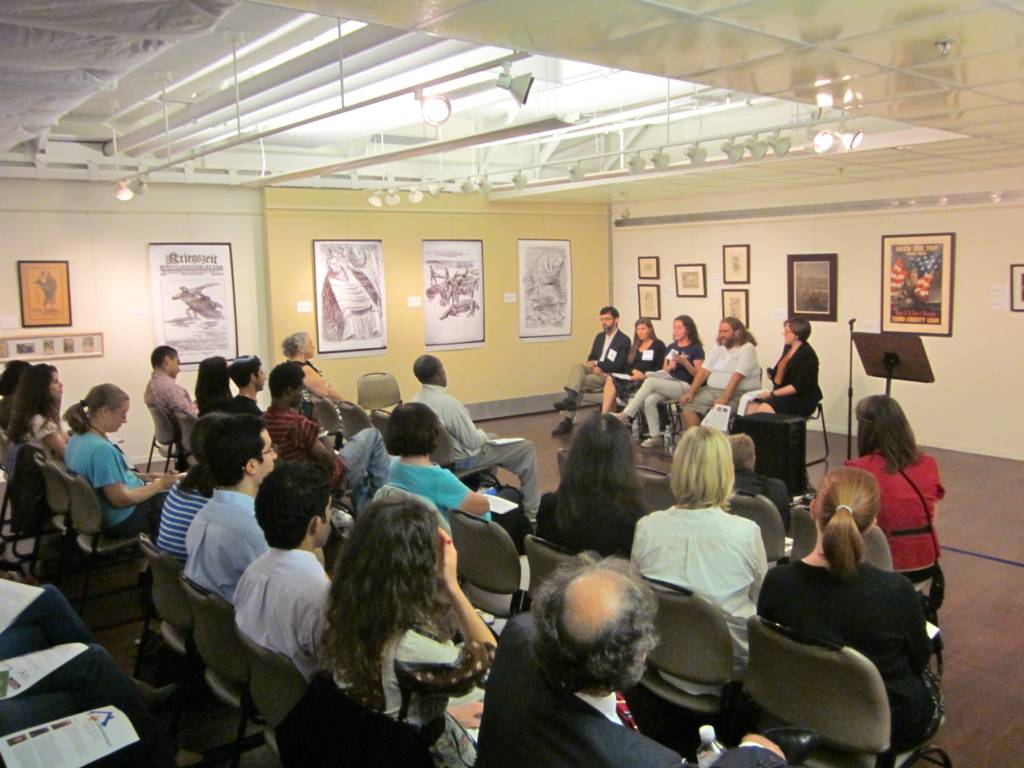Homeless people face complex health challenges. In some cases, they struggle daily with the illnesses and disabilities that contributed to their homelessness in the first place. In other cases, life on the streets leads to new health problems and traumas. Everything from getting adequate food to managing chronic conditions can be difficult. Fortunately there are local and national organizations working to address these problems through research, health care policy and direct services.
As part of its ongoing “Lessons of Hope” series, Street Sense hosted a forum on physical health and homelessness Monday, Sept. 22 at the Pepco Edison Place Gallery in Northwest D.C. During the event, five panelists shared their insights on the problems and solutions related to healthcare for the homeless, with an audience of approximately one hundred community partners, business leaders, vendors, students, local advocates, and young professionals.
Kate Sheppard, senior reporter and editor at the Huffington Post, moderated the discussion with a series of questions, leading off with a focus on the daily health challenges faced by many homeless people.
Panelist and Street Sense vendor John “Mick” Matthews, homeless for a half a dozen years, began the conversation, offering a first-hand perspective. He said he had suffered three heart attacks while living on the street in recent months.
“Those were some of the scariest times of my entire life,” Matthews said, describing the wear and tear that street life has taken on his body and the days when it has taken him an hour to walk one city block. Even obtaining basic food and hygiene can be a difficult journey, Matthews related sadly.
“I had to walk across town for many services, the next meal, a shower,” he said.
Others on the panel offered their own thoughts on common health challenges homeless people face. Catherine Crosland, who serves as medical director for homeless outreach services at Unity Health Care, explained that homelessness leaves people vulnerable to everything from physical assaults to communicable illnesses. The indigent often lack access to bathing facilities. They may go without safe places to keep their medicines and the medical help they need to manage pre-existing conditions. Serious diseases are a particular burden, Crosland stated. In the District, while three percent of the population has HIV, five to 10 percent of homeless individuals carry the virus that causes AIDS. Homeless people are also more likely to be the victims of sexual abuse, she said.
Other panelists turned their attention to potential ways to address these problems. Dan Rabbitt, who works as a health policy organizer for the National Health Care for the Homeless Council, offered two solutions. First, he said he believes that activists should focus on using the Affordable Care Act to expand access to health care services. So far, 27 states have used the nation’s health care reform law to expand Medicaid, providing medical benefits to poor and uninsured people who lacked them. Rabbitt acknowledged that in other states, Medicaid expansion remains a contentious issue. Beneficial as it may be for the poor, many politicians see it as a liability to embrace any part of the Obamacare legislation, he noted.
Even in states where Medicaid has been expanded, signing up is not always possible, according to Emily Buzzell, a senior case manager at Miriam’s Kitchen. For those who lack documentation, identity cards, or a social security number, obtaining health care benefits can be very difficult.
“The structural system presents lots of challenges to those that are homeless,” stated Buzzell.
A shortage of providers who participate in Medicaid further complicates access to care, she said.
Several panelists focused on the lack affordable housing as one of the biggest contributors to homelessness and poor health across the nation.
As the District’s real estate boom continues, Rabbitt and Crosland stressed that low-wage workers are finding it increasingly difficult to find housing they can afford. A single breadwinner would need to work 2.5 full-time minimum wage jobs to afford a modest apartment at the current rates, Crosland said.
While these issues are daunting, there are innovative solutions being offered.
“Housing is the best form of healthcare for individuals experiencing homelessness,” stated Buzzell.
She explained that Housing First programs, which are being put in place in many cities including Washington, are getting chronically homeless people off the streets and into stable homes. Such programs make it possible for people to address the problems and health issues that contributed to their homelessness in the first place. Housing and health care both need to be made more readily available, the panelists agreed. To make these changes happen will require activism, Rabbitt stressed.
“One of the biggest things you can do is vote, pay attention and support public officials who care about this issue,” he said.
Supporting movements such as the Way Home Campaign and continually raising the importance of health care for the homeless with public officials are both essential, added Matthews.
“They will have no choice but to answer,” he noted before a sea of applause filled the room.








